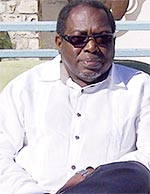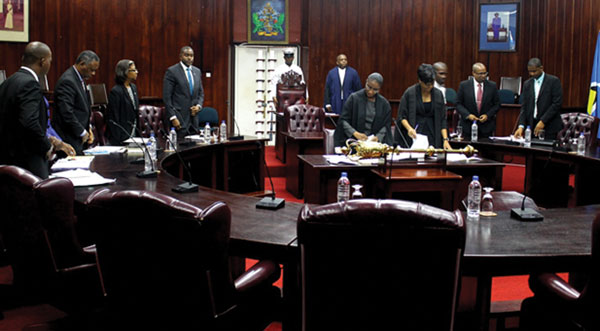
ST. LUCIA’S model of government is inherited from and based on the British system of Westminster Parliamentary democracy. Under this system, the government of the country is formed by the party whose members are the majority of the elected members of its legislature who utilise that majority to select the Prime Minister who, in turn, picks his Cabinet of Ministers from among that majority.
In Britain’s legislature, the 650-member House of Commons, it is not a problem for a Prime Minister to pick a 20-plus member Cabinet knowing that those not selected will not be aggrieved; neither has it been a problem, for the last six hundred years, for the Commons to smoothly elect a Speaker of the House and a Deputy from among themselves.
What, therefore, does the practice of the selection of the Speaker and Deputy Speaker of the British House of Commons and their roles tell us about the unprecedented situation in Saint Lucia of its legislature — the House of Assembly — functioning without a Deputy Speaker, incredibly, for over one year?
Does the Parliament of the former Mother Country provide any solutions for the impasse in St. Lucia which came to a head on October 31, 2017 when the Speaker of the House of Assembly collapsed after a marathon House session and had to be hospitalized for a night and the business of Parliament suspended for one month because of the lack of a Deputy Speaker?
It is interesting that the provisions of the independence constitution which the British drew up for Saint Lucia are radically different to the practice of the UK Parliament on the subject of the election of the Speaker and a Deputy Speaker of Parliament.
The Saint Lucia Constitution, Section 35 (2) states that: “the Speaker may be elected either from among the members of the House who are not members of the Cabinet or Parliamentary Secretaries or from persons who are not members of the house.”
On the other hand, under Section 36, the House “shall elect a member of the House, who is not a member of the Cabinet or Parliamentary Secretary to be Deputy Speaker of the House”. The Speaker, therefore, can be chosen either from within the House or outside of the House but the Deputy must be a member of the House (of course, but not a member of Cabinet).
In the United Kingdom, although it is not written in the constitution because the British do not have a written constitution, the Speaker of the House of Commons and the Deputy must be members of that House. It is a convention that has been observed since 1377 when the House of Commons first agreed to have a Speaker. In the UK, the Speaker is elected when the Parliament convenes after a general election.
The members of parliament vote for a Speaker from a list of candidates who present themselves for the post. Candidates are, therefore, from the various political parties in the House of Commons and not solely nominees of the majority party. However, once elected to be Speaker of the House, the successful candidate must resign from his/her political party and remain separate and above political issues.
The Speaker, as the presiding officer of the House, must remain impartial. By convention, a person who is elected to be Speaker of the House of Commons is not opposed in the subsequent general election(s) by the major political parties who do not field candidates in the Speaker’s constituency.
During the general election campaign, a Speaker does not canvass for support on political issues but presents himself/herself as the Speaker who is seeking re-election. When the Parliament convenes after the general elections, if the former Speaker is desirous of continuing in office, then that person’s reelection is a formality; again, in accordance with convention, a sitting Speaker has always been re-elected and no new majority party in the House has ever changed the Speaker because he is from the opposition party.
As for the Deputy Speaker, the UK Parliamentary Standing Orders provide for three deputies to assist the Speaker in chairing House debates and with other duties. They are to be elected “at the commencement of every Parliament or from time to time, as necessity may arise”. The Deputy Speakers are called chairpersons of the Ways and Means committee so that the candidate obtaining the most votes is known as the Chairman of the Ways and Means committee and the second and third – first and second Deputy chairman, respectively.
The Chairman is, therefore, known as the Deputy Speaker, and the others First Deputy Speaker, and Second Deputy Speaker. Similarly to the Speaker, they must be politically impartial but unlike him they do not resign from their political parties. However, there is a convention that there must be a balance between government and opposition parties in the allocation of these four presiding officers. This is confirmed in Section 2A (5) (e) of the Standing Order of the House of Commons.
“The ballot shall be counted under the Single Transferable Vote System with constraints that of those elected:
(i) two candidates shall come from the opposite side of the House to that from which the Speaker was drawn, the first of which candidates will be Chairman of Ways and Means and the second, Second Deputy Chairman of Ways and Means;
(ii) one candidate shall come from the same side of the House as that from which the Speaker was drawn and shall be First Deputy Chairman of Ways and Means; and
(iii) at least one man and at least one woman shall be elected across the four posts of Speaker and Deputy Speakers.
Of even greater interest with regard to the situation in Saint Lucia are the conventions on the sharing of duties and responsibilities between the Speaker and the Deputies. By convention, the Chairman of the Ways and Means committee – the Deputy Speaker – always chairs the Budget debate and sessions of the Committee of the Whole House. A Commons information sheet states: “During debates of the House the practice in recent times is for the Speaker to have three spells in the chair: 14:30 to 16:30, 18:30 to 19:30 and a period near the end of the day. For the rest of the time, one of the Deputies will preside”.
Next week: “The Lesson of Convention”.














